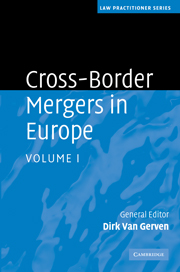Book contents
- Frontmatter
- Contents
- Contributors
- Preface
- Part I EC rules on cross-border mergers
- Part II Application in each Member State National reports for the EU Member States
- 5 Austria
- 6 Belgium
- 7 Bulgaria
- 8 Cyprus
- 9 Czech Republic
- 10 Denmark
- 11 Estonia
- 12 Germany
- 13 Hungary
- 14 The Netherlands
- 15 Poland
- 16 Slovak Republic
- 17 United Kingdom
- Part III Application in the EEA Member States
- Part IV Annexes
- Index
9 - Czech Republic
from Part II - Application in each Member State National reports for the EU Member States
Published online by Cambridge University Press: 03 May 2010
- Frontmatter
- Contents
- Contributors
- Preface
- Part I EC rules on cross-border mergers
- Part II Application in each Member State National reports for the EU Member States
- 5 Austria
- 6 Belgium
- 7 Bulgaria
- 8 Cyprus
- 9 Czech Republic
- 10 Denmark
- 11 Estonia
- 12 Germany
- 13 Hungary
- 14 The Netherlands
- 15 Poland
- 16 Slovak Republic
- 17 United Kingdom
- Part III Application in the EEA Member States
- Part IV Annexes
- Index
Summary
Introduction
1. The Cross-border Merger Directive has been implemented in the Czech Republic by the Act on Transformation of Commercial Companies and Cooperatives which the Czech Parliament adopted on 19 March 2008 (the ‘Transformation Act’). The Transformation Act is a broad regulation, however, that sets forth the rules governing all types of transformations of companies and cooperatives (e.g. merger, split-off, transfer of assets of shareholders and change of legal form of a company) carried out at both the national and the cross-border level that replace the older relevant provisions of the Czech Commercial Code. These provisions applied only to domestic transactions and were abolished with the enactment of the Transformation Act. The second part of the Transformation Act contains the rules on mergers and section IX of this part lays down special provisions on cross-border merger in accordance with the Cross-border Merger Directive.
The realisation of a cross-border merger is subject to the provisions of the Transformation Act on domestic mergers unless section IX stipulates otherwise (Art. 180 Transformation Act). The Transformation Act and other special Czech laws and regulations govern Czech entities participating in a crossborder merger (Art. 187 Transformation Act).
Scope of the new rules
2. The Transformation Act's rules apply to cross-border merger, which is defined as a merger of one or more (Czech) commercial companies or cooperatives with one or more foreign corporations (Art. 68 Transformation Act).
- Type
- Chapter
- Information
- Cross-Border Mergers in Europe , pp. 147 - 168Publisher: Cambridge University PressPrint publication year: 2010

